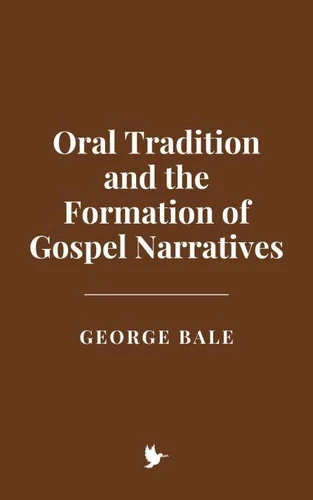Oral Tradition and the Formation of Gospel Narratives
Par :Formats :
Disponible dans votre compte client Decitre ou Furet du Nord dès validation de votre commande. Le format ePub est :
- Compatible avec une lecture sur My Vivlio (smartphone, tablette, ordinateur)
- Compatible avec une lecture sur liseuses Vivlio
- Pour les liseuses autres que Vivlio, vous devez utiliser le logiciel Adobe Digital Edition. Non compatible avec la lecture sur les liseuses Kindle, Remarkable et Sony
 , qui est-ce ?
, qui est-ce ?Notre partenaire de plateforme de lecture numérique où vous retrouverez l'ensemble de vos ebooks gratuitement
Pour en savoir plus sur nos ebooks, consultez notre aide en ligne ici
- FormatePub
- ISBN8231981663
- EAN9798231981663
- Date de parution23/05/2025
- Protection num.pas de protection
- Infos supplémentairesepub
- ÉditeurWalzone Press
Résumé
Oral Tradition and the Formation of Gospel Narratives by George Bale offers a comprehensive and scholarly exploration of how the life, teachings, and legacy of Jesus Christ were preserved and transmitted through oral culture before being codified in the written Gospels. Tracing the rich interplay between Jewish and Hellenistic oral traditions, the book delves into key theories of oral transmission, performance, and memory that shaped the early Christian proclamation.
From the pioneering work of form critics to modern critiques and the vital role of eyewitness testimony, Bale illuminates the dynamic processes through which fragmented sayings, parables, and miracle stories coalesced into coherent narrative works. With careful historical context and detailed analysis, this volume reveals the Gospels as living documents born from vibrant oral performances-faithful yet adaptable reflections of communal memory and theological intent.
Essential reading for scholars, students, and anyone seeking a deeper understanding of the origins and enduring power of the Gospel narratives.
From the pioneering work of form critics to modern critiques and the vital role of eyewitness testimony, Bale illuminates the dynamic processes through which fragmented sayings, parables, and miracle stories coalesced into coherent narrative works. With careful historical context and detailed analysis, this volume reveals the Gospels as living documents born from vibrant oral performances-faithful yet adaptable reflections of communal memory and theological intent.
Essential reading for scholars, students, and anyone seeking a deeper understanding of the origins and enduring power of the Gospel narratives.
Oral Tradition and the Formation of Gospel Narratives by George Bale offers a comprehensive and scholarly exploration of how the life, teachings, and legacy of Jesus Christ were preserved and transmitted through oral culture before being codified in the written Gospels. Tracing the rich interplay between Jewish and Hellenistic oral traditions, the book delves into key theories of oral transmission, performance, and memory that shaped the early Christian proclamation.
From the pioneering work of form critics to modern critiques and the vital role of eyewitness testimony, Bale illuminates the dynamic processes through which fragmented sayings, parables, and miracle stories coalesced into coherent narrative works. With careful historical context and detailed analysis, this volume reveals the Gospels as living documents born from vibrant oral performances-faithful yet adaptable reflections of communal memory and theological intent.
Essential reading for scholars, students, and anyone seeking a deeper understanding of the origins and enduring power of the Gospel narratives.
From the pioneering work of form critics to modern critiques and the vital role of eyewitness testimony, Bale illuminates the dynamic processes through which fragmented sayings, parables, and miracle stories coalesced into coherent narrative works. With careful historical context and detailed analysis, this volume reveals the Gospels as living documents born from vibrant oral performances-faithful yet adaptable reflections of communal memory and theological intent.
Essential reading for scholars, students, and anyone seeking a deeper understanding of the origins and enduring power of the Gospel narratives.

















